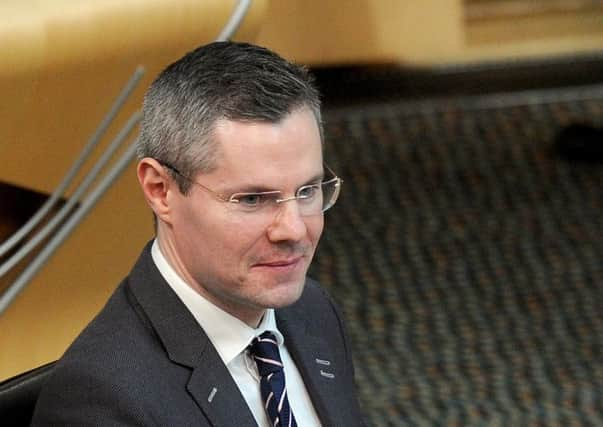Bill Jamieson: Scottish Budget 2017: Derek Mackay's horn of plenty


A 7% uplift in funding for business R&D; more than £400 million plus for health resource funding; £243m investment next year for early year childcare; £600m investment confirmed to deliver super-fast broadband … the magic horn just kept delivering: £2.4 billion for enterprise and skills; end of the 1 per cent pay cap for public sector workers, £110m for reform of primary care … Stop! Any more of this and we would run out of fingers and toes to count all the largesse.
All this with modest increases in the tax take for middle and top earners, a tax cut for those on low incomes, and a new 21p tax band for those earning £24,000 – enabling him to deliver a Tory-dishing boast that the majority of earners in Scotland would be paying less than in the rest of the UK under his proposals.
Advertisement
Hide AdAdvertisement
Hide AdWe may have a relatively small number of taxpayers compared to the working-age population – but we are now sporting no less than five income tax bands – a bonanza for tax accountants.
But what generosity! What magic alchemy! How was it all possible? Here we come to the paradox of this budget - well camouflaged by an impressive and thoroughly competent display by the minister of budgetary spin.
For just as he had got into full stride than details appeared of the economic growth forecasts from our new Scottish Fiscal Commission. And what grim reading they made.
From wherever else Mr Mackay was stocking up in his horn of plenty, it wasn’t from economic growth. For the SFC unveiled the lowest set of growth numbers in the history of the devolved parliament.
Commission chairwoman Lady Susan Rice laid bare figures showing the economy will grow at less than one per cent a year until 2022. Next year it will be just 0.7 per cent – half the 1.4 per cent forecast by the Office for Budget Responsibility for the UK overall.
Mr Mackay laid much of the blame on Brexit uncertainties and demographic challenges.
But as these are as keenly felt across the rest of the UK as in Scotland, why is our growth rate forecast to be half of that elsewhere?
Arguably the best question of the session came from Labour MSP Jackie Baillie who asked the finance minister to explain the low growth numbers and how exactly his budget would improve matters.
Advertisement
Hide AdAdvertisement
Hide AdThere was much re-iteration about more money for education, skills and enterprise – but no figures were forthcoming.
The focus remains – unremittingly – on how more money will be spent, not on how the economy will generate more revenue. As for his income tax changes, Mr Mackay played some skilful politics: there will be a new starter rate of 19p in the pound for those earning between £11,850 and £13,850 – hardly meriting mass dancing in the street.
But it enabled him to claim that two-thirds of income taxpayers will pay less tax under his proposals.
There will be a new tax band of 21p for those earning over £24,000 – mean, petty and hardly meriting the description as “those with the broad shoulders” – while the higher rate of tax will be increased from 40p to 41p and the top rate from 45p to 46p. The one saving grace of all this fiddling about with small changes is that he has listened to those warnings of “behavioural change” – the consequences of jacking up tax rates on middle to high earners, encouraging them to arrange their affairs differently. That is a sensible recognition of tax realities.
But as for the economy overall – I fear Mr Mackay’s horn of plenty has a hole at the bottom.
